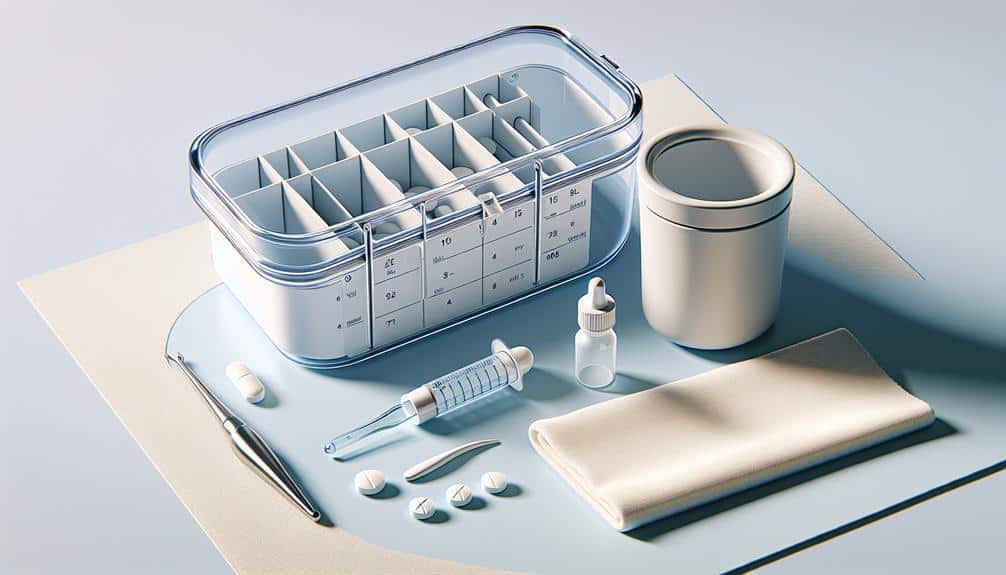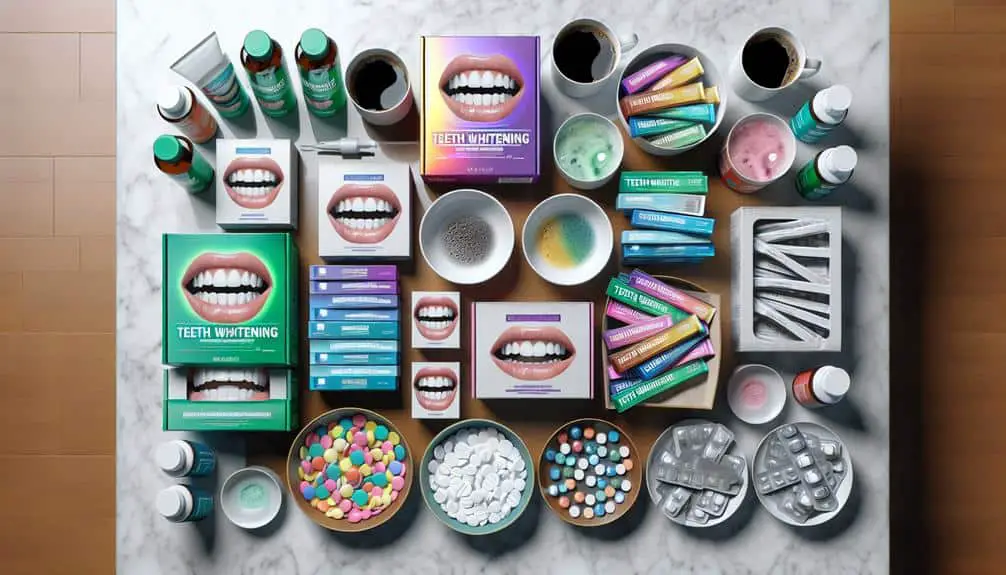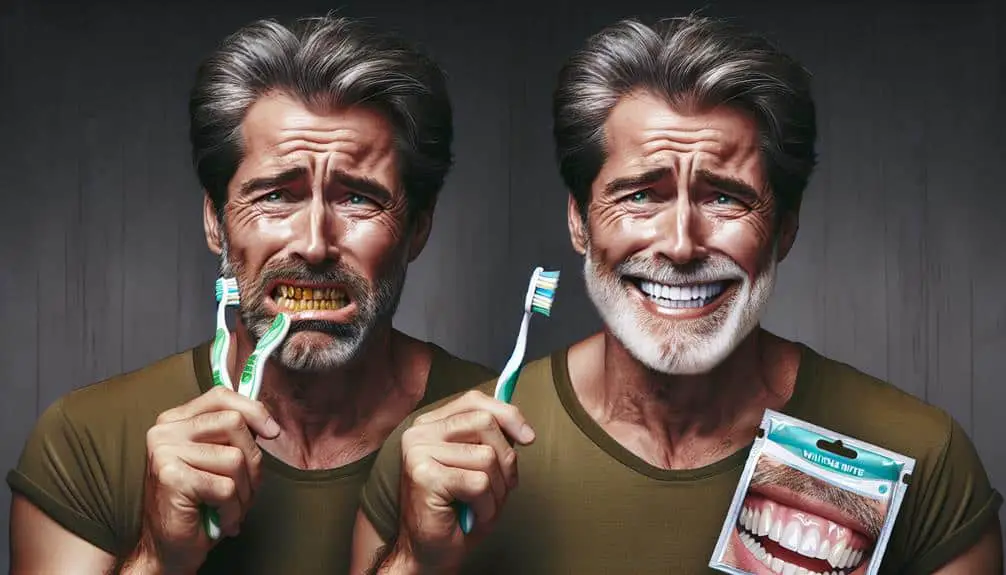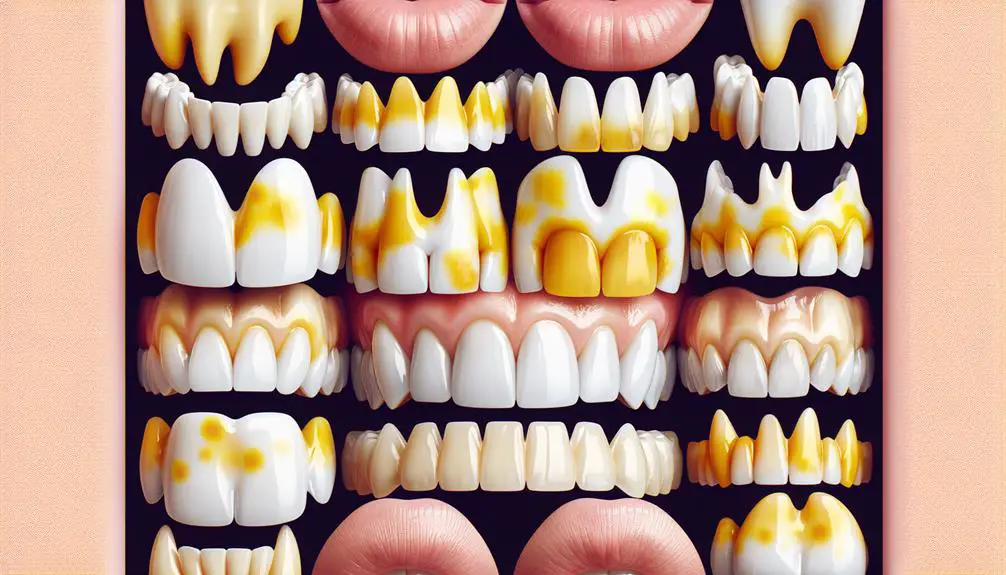Prevent medication stains by choosing whitening toothpaste with hydrogen peroxide or carbamide peroxide. Use strips for extra whitening. Maintain oral health with regular dental visits and proper flossing. Try a whitening mouthwash with hydrogen peroxide. Adjust medication timing to avoid staining. Explore professional whitening treatments for advanced care. Mastering these methods can help you achieve a stain-free smile.
Key Points
- Adjust medication timing to prevent staining by taking medications away from brushing times.
- Consider professional whitening treatments for advanced stain removal options.
- Use whitening toothpaste with active ingredients to combat medication stains.
- Implement a whitening mouthwash approved by the ADA to remove surface stains.
- Maintain regular dental check-ups for early detection and prevention of oral health issues.
Choosing the Right Whitening Toothpaste
When choosing a whitening toothpaste to help prevent medication stains, consider the active ingredients and their effectiveness in removing surface discoloration. Look for toothpaste ingredients like hydrogen peroxide or carbamide peroxide that are recognized for their whitening properties. These components work by breaking down the stains on the surface of your teeth, aiding in revealing a brighter and whiter smile.
Furthermore, some whitening toothpaste may contain abrasive agents that can assist in eliminating surface stains caused by medications. However, be cautious with abrasive toothpaste as excessive use can wear down enamel over time. Whitening strips can also be a good option to enhance the whitening effect of your toothpaste. These strips are coated with a whitening gel that contains hydrogen peroxide and can reach areas between teeth that toothpaste may overlook.
Remember to follow the instructions provided with the whitening strips and toothpaste to guarantee safe and effective use. By integrating these products into your oral care routine, you can help prevent medication stains and maintain a brighter smile.
Regular Dental Check-ups
Regular dental check-ups are essential for maintaining excellent oral health and addressing any potential issues early on. These routine visits play a fundamental role in preventing medication stains on your teeth. Here are some essential tips to maximize the benefits of your regular dental check-ups:
- Flossing Techniques: Proper flossing is important for removing plaque and food particles between your teeth that your toothbrush can't reach. Ask your dentist to demonstrate the correct flossing techniques to make sure you're effectively cleaning between your teeth.
- Toothbrush Maintenance: Your toothbrush is a critical tool for maintaining oral hygiene. Replace your toothbrush every 3 to 4 months or sooner if the bristles are frayed. Additionally, rinse your toothbrush thoroughly after each use and store it in an upright position to air dry.
- Professional Cleanings: Regular dental check-ups often include professional cleanings to remove plaque and tartar buildup, which can contribute to medication stains.
- Early Detection: Dental check-ups allow your dentist to identify any oral health issues early, preventing them from developing into more significant problems.
Implementing a Whitening Mouthwash
To further enhance your oral care routine and combat medication stains, consider incorporating a whitening mouthwash into your daily regimen. Whitening mouthwash offers several benefits beyond just freshening your breath. It can help remove surface stains on your teeth, giving you a brighter smile. Additionally, some whitening mouthwashes contain hydrogen peroxide or other whitening agents that can help lighten stains over time.
When choosing a whitening mouthwash, look for one that has the American Dental Association (ADA) seal of approval to guarantee its safety and effectiveness. Remember, while whitening mouthwash can help improve the appearance of your teeth, it isn't a replacement for professional whitening treatments at the dentist's office.
If you prefer a more natural approach or have sensitive teeth, there are alternative options available, such as charcoal-infused mouthwashes or alcohol-free whitening mouthwashes. These alternatives can still provide some whitening benefits while being gentler on your teeth and gums. Incorporating a whitening mouthwash into your daily routine can be a simple yet effective way to maintain a bright, stain-free smile.
Adjusting Medication Timing
Consider adjusting the timing of your medication intake to minimize the risk of staining your teeth.
Here are four essential tips for timing adjustment and dosage scheduling to aid in stain prevention:
- Time it Right: Take medications that may cause staining, such as certain antibiotics or antihistamines, at least 30 minutes before brushing your teeth or at a different time of day than when you normally brush. This can reduce the contact time between the medication and your teeth, minimizing the potential for stains.
- Brush Before: If you need to take a medication known for staining, brush your teeth before taking it. A clean surface is less likely to attract and hold onto pigments that could cause discoloration.
- Follow Dosage Recommendations: Stick to the prescribed dosage and schedule provided by your healthcare provider. Avoid taking more than necessary, as increased exposure to medications could heighten the risk of staining.
- Stay Hydrated: Drinking water when taking medications can help wash away residue and reduce the concentration of substances that might lead to tooth discoloration. Maintaining good hydration levels can also aid in overall oral health.
Seeking Professional Whitening Treatments
For essential whitening treatments that effectively address medication stains on your teeth, consult with a dental professional to explore suitable options based on your specific needs and oral health condition. Cosmetic dentistry offers various advanced whitening procedures that can help in removing stubborn medication stains and restoring the natural whiteness of your teeth. These treatments are designed to be safe and effective under the supervision of trained professionals.
Professional whitening treatments provided by cosmetic dentists often involve using high-quality whitening agents that penetrate the enamel to break down and remove stains caused by medications. These treatments can be tailored to suit your individual needs, ensuring ideal results while maintaining good oral hygiene practices.
It is vital to follow post-treatment care instructions provided by your dentist to prolong the effects of the whitening procedure and prevent future medication stains. By combining professional whitening treatments with a consistent oral hygiene routine, you can enjoy a brighter, stain-free smile and boost your overall confidence.
Frequently Asked Questions
Are There Any Natural Remedies or Home Remedies That Can Help Prevent Medication Stains on Teeth?
When trying to prevent medication stains on your teeth, natural and home remedies can be beneficial. Incorporating practices like oil pulling, using baking soda, or rinsing with apple cider vinegar may help maintain your dental health.
Can Certain Types of Medications Cause More Severe Staining on Teeth Than Others?
Certain medication types, like antipsychotics and antihistamines, can cause severe staining on teeth due to their chemical composition. Prevention methods, such as regular dental cleanings and using a straw for liquid medications, can be effective in reducing staining.
How Long Does It Typically Take for Medication Stains to Develop on Teeth?
To prevent medication stains, maintain excellent dental hygiene. Stain development varies based on medication type and individual habits. Consistent brushing, flossing, and regular dental visits can help mitigate staining effects. Be proactive in prevention methods for best oral health.
Are There Any Specific Dietary Changes That Can Help Prevent Medication Stains on Teeth?
To prevent medication stains on teeth, consider dietary habits and lifestyle changes. Incorporate enamel protection into your oral hygiene routine. Avoid acidic foods and drinks, brush regularly, and use fluoride toothpaste. These steps can help maintain a bright smile.
Are Children More Susceptible to Medication Stains on Their Teeth Compared to Adults?
When it comes to children's dental hygiene, safeguarding enamel is key. Kids tend to be more vulnerable to medication stains than adults. So, prioritize protective measures like fluoride treatments and regular dental check-ups to maintain those pearly whites!



